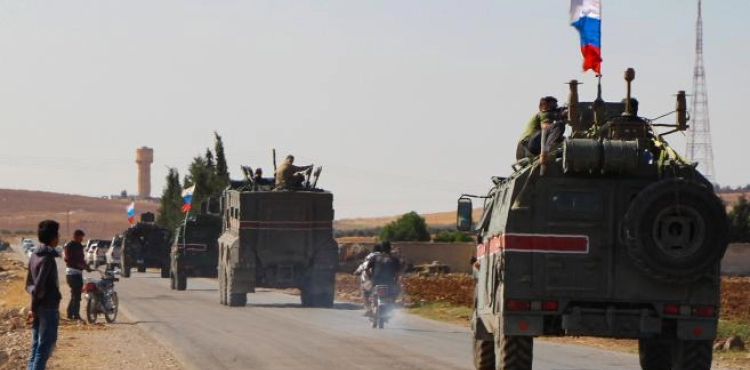Russian troops on Wednesday launched their first patrol in northern Syria near the border with Turkey, a day after an agreement between Ankara and Moscow effectively lost control of large areas of northeastern Syria.
Kurdish forces, which had controlled about a third of Syria´s territory two weeks ago, lost much of their influence after Tuesday´s accord granted Turkey the right to deploy along its border with Syria, the main target of Turkey´s October 9 attack.
Under the agreement reached by Russia and Turkey to withdraw Kurdish forces about 30 kilometers from the length of the Turkish border of 440 kilometers, which means forcing them to abandon some of the main cities under their control.
The Russian Defense Ministry said it had conducted its first patrol in northern Syria, after it had previously announced that a Russian military convoy crossed the Euphrates River "and advanced towards the Syrian-Turkish border."
The agreement stipulates that Russian military police and Syrian border guards "facilitate the withdrawal" of YPG elements and their weapons from the border area, to be completed within 150 hours.
US President Donald Trump, who has been heavily criticized for his sudden decision to withdraw US troops from northern Syria and accused of abandoning the Kurds, hailed the deal as "great success."
The "historic" agreement, according to Turkish President Recep Tayyip Erdogan, undermines the dream of the Kurdish minority to maintain their own administration, and may lead to the integration of their forces into the ranks of the regime´s army.
Erdogan vowed on Wednesday to take "necessary measures" if Kurdish forces remain near the border.
Ankara considers the YPG to be "terrorist" and an extension of the outlawed Kurdistan Workers Party (PKK), which has waged a rebellion there since 1984.
After 150 hours, Russia and Turkey are conducting joint patrols in two districts, 10 kilometers east and west of the area controlled by Turkey in its Operation Peace Spring, which is 120 kilometers long and 32 kilometers deep between the towns of Ras al-Ain and Tel Abyad.
This would allow Turkey to conduct joint patrols with Russia in areas inside Syrian territory not covered by its military operation.
An AFP correspondent near the border town of Kobani (Ain al-Arab) said he saw several military vehicles carrying a Russian flag enter the area on Wednesday.
RIA Novosti news agency quoted the Russian Defense Ministry as saying that members of the military police met with officials in the region and are scheduled to begin patrolling soon.
Last week, Syrian army troops entered the city, which was controlled by Kurdish fighters.
The Syrian Observatory for Human Rights, for its part, said that the area of ​​"safe area" was quiet Wednesday.
However, he reported bombings in different areas in northeastern Syria, including the city of Qamishli, a predominantly Kurdish city, and the town of behavior in the area of ​​Tal Abyad near the Turkish border.
The bombing took place in the city center of Qamishli and there were no casualties, according to the Syrian Observatory for Human Rights.
A leader of a pro-Ankara Syrian faction told AFP that the bombing in the behavior of pro-Turkish factions had killed three fighters.
It was not clear who was behind the bombing.
In Qamishli, which is controlled by the Kurds and not covered by the Sochi agreement, hundreds protested against the agreement on Wednesday, saying it amounted to "ethnic cleansing and genocide."
"This agreement takes into account the interests of the countries and does not take into account the interests of the peoples," Talaat Younis, an official in the autonomous administration, told AFP.
"Turkey´s goal is to kill and displace the Kurds," he said, as protesters waved flags and chanted anti-Turkish slogans.
On October 9, Turkey launched an offensive in Syria after US forces withdrew their forces along the border, which served as a buffer between Turkey, Washington´s NATO ally, and fighters in Syria´s democratic forces.
The Kurds are in a critical position after Washington´s withdrawal, prompting them to embrace Damascus to support them to counter the attack.
Under the agreement, regime forces, backed by the Russian army, deployed in the northern regions. It entered several cities, most notably Kobani, Manbij and Ain Issa.
According to the official Syrian news agency SANA on Wednesday that "new columns of army units, including tanks and military vehicles enter the villages of Raqqa and Hasaka to strengthen the deployment of the army in the Syrian island."
Damascus has long accused the Kurds of treason for their alliance with Washington, and has repeatedly reiterated its intention to regain control of all of Syria.
The Kremlin said Wednesday that Washington "betrayed" its Kurdish allies by withdrawing from northeastern Syria, and abandoned them by confronting Turkey.
"In recent years, the United States has been the closest ally of the Kurds," said Kremlin spokesman Dmitry Peskov. "But in the end, the United States abandoned the Kurds and thus betrayed them."
US Defense Secretary Mark Esper arrived in Baghdad on Wednesday to meet his Iraqi counterpart Najah al-Shammari, after his troops arrived Monday in the Kurdistan region in northern Iraq after its withdrawal from northeast Syria.
Syrian President Bashar al-Assad said in a telephone conversation late Tuesday with Russian President Vladimir Putin that "the owners of separatist goals" bear "responsibility for what has been the current situation," referring to the Kurds.
The Turks and the Russians worked closely together on the Russian dossier, despite their support from opposing parties.
The two sides affirmed in their recent agreement "their determination to fight terrorism in all its forms and manifestations and to disrupt separatist projects in Syrian territory."
The agreement also provided for "joint efforts to facilitate the voluntary and safe return of refugees".
Ankara says 3.6 million Syrian refugees could return and live in the safe area.












